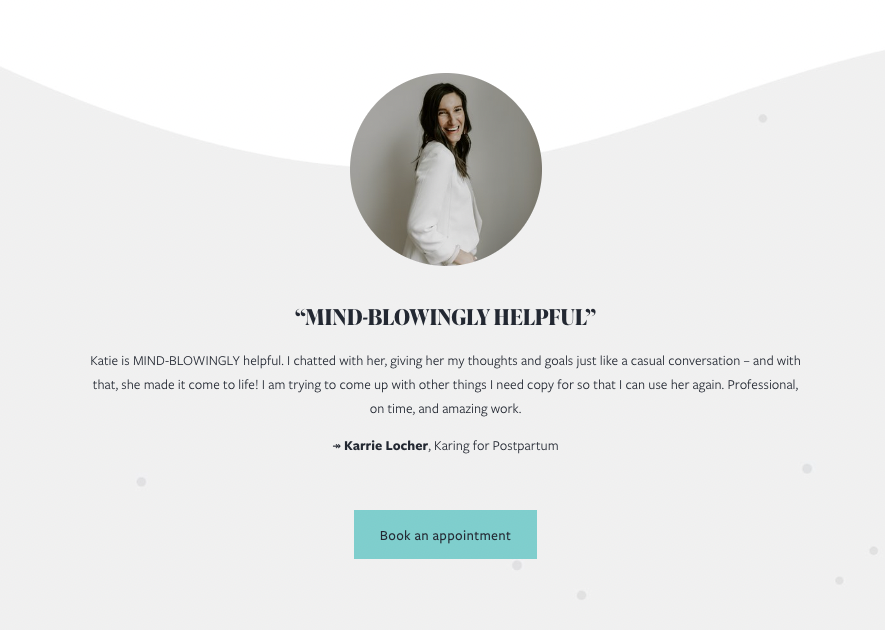Unlocking the Power of Testimonials: A Guide for Marketing Strategists
April 18, 2024
Testimonials or reviews are an effective way to build authority for your brand. They’re an opportunity for your customers to talk about you and promote the services and outcomes they experienced. The magic element of a well-crafted testimonial is that it lends credibility to your authority because it’s not your brand sharing the services or outcomes — your customers are talking.
If you think about it, your website, social media and email content are all pieces that are coming “from the horse’s mouth” — directly from your brand. Your customers’ shared feedback is modern day word-of-mouth marketing.
After developing 350+ Brand Messages for customers over the years, we’ve experimented with multiple ways of communicating authority for our clients. In addition to testimonials, we’ve utilized case studies, behind the scenes, process plans, white papers and brand videos. And most brands need some combination of all of the above. But we’ve yet to find a brand that doesn’t benefit from testimonials.
Because this is a marketing tactic that literally every organization can and should leverage, I’ll share why brands need testimonials and some practical tips of how to generate effective comments from your customers that you can use in your marketing.
The Significance of Testimonials in Marketing
Trust is the currency of customer decision-making and testimonials stand out as powerful endorsements of the brand’s credibility and service. We’ve found four main reasons why reviews or testimonials are so effective in building trust with future buyers.
1 – Outside Opinions Create Credibility and Trustworthiness
Testimonials are real-life evidence of the brand’s ability to deliver on its promise. When a potential customer sees current or past customers share their positive experiences, it instills confidence and reduces skepticism. Let’s face it, traditional advertising is losing credibility in the eyes of consumers. Testimonials combat that reality by allowing an authentic voice to resonate with the audience.
2 – Builds Social Proof for Potential Customers
Very few people want to be the lone wolf. We’re social creatures and look to the actions and opinions of others to guide our decisions. Just last month, I asked all my friends what they thought of their Vitamix before I made my selection. Testimonials are social proof. People are more likely to take action when they see others doing the same. Whether it’s communicated in a glowing Google review or a heartfelt recommendation from a friend, testimonials reassure potential customers that they’re making the right choice.

3 – Enhances brand reputation and loyalty
Beyond attracting new customers, testimonials play a pivotal role in nurturing existing relationships with your customers. Showing positive experiences of happy customers strengthens the brand’s reputation and fosters loyalty among its existing customer base. Plus, when customers see their stories shared and celebrated, their emotional connection to the brand deepens, leading to long-term raving fan status.
4 – Impacts conversion rates and sales
The ultimate effectiveness of testimonials can be measured in the impact on conversion rates and sales. And we feel that in our gut — we don’t need the countless studies that have demonstrated the correlation between positive testimonials and increased purchase intent. We see that in ourselves when we’re shopping for a Vitamix and even smaller, more everyday purchases like dog food or oatmeal. As seen in a well-placed testimonial on a sales page or a customer success story in an email campaign, testimonials have the power to turn hesitant buyers into customers.

Now that we’re on the same page when it comes to the importance of using testimonials, it’s time for the difficult task of getting them. After doing this for our clients and for Murphy Marketing, we’ve seen some patterns emerge.
Four Tips for Getting High-Quality Testimonials
TIP #1: Identify and Target Satisfied Customers
Depending on your product, service and customer base, you may want to consider a customer feedback channel such as a survey, product review, or social media comments to search for satisfied customers who are likely to share a positive testimonial. Once you’ve identified them, you’ll want to reach out to them and express your gratitude for their support. When you ask that person if they’d be willing to share a testimonial or review, you may consider if your brand needs to offer an incentive or reward for doing so. This isn’t mandatory, but something to consider — would you want to leverage a discount on a future purchase, exclusive access to new products or something else that will help motivate customers to take time to share their thoughts.
TIP #2: Communicate the purpose of your testimonials
Your raving fans likely want your business to succeed. And when you share how they can contribute to your growth and success by providing a testimonial, that’s typically all you have to do. It may be as simple as saying that their testimonial will help you attract more amazing customers like them and/or help more people make informed decisions as they consider options.
TIP #3: Adjust the medium for your audience
Consider your ideal audience and how they prefer to receive information. Some audiences may skew to prefer written word while others prefer video. You likely need a mix of both as realistically, your raving fans may not wish to appear on video or they may not feel confident in their writing. The mix will be helpful as well as you consider your distribution of your testimonials. Most brands will need some written ones and some video in order to place them in different marketing channels such as your website, email campaigns, socials, etc.
TIP #4: Ask open-ended questions
The last thing you want to do is go through all of this effort only to get “This was awesome” testimonials. You want your fans to share the transformation they experienced and maybe even the journey that helped them get there. So, as you’re going into these conversations with your clients, send them some thought-provoking questions that will help answer some of the FAQs you get from curious shoppers.
We’ve developed a Guidebook for purchase Better Testimonials Today ($17) to help you craft these compelling questions that will lead to testimonials that make a difference to your bottom line.
Important Caveat: What if my clients are confidential?
I understand that not every industry is as testimonial-ready. You are either working with some strong compliance standards or working under an NDA. In those cases, testimonials are a no-go. And that importantly doesn’t mean that building authority is a dead-end. We just need to get a little more creative. When we’ve worked with clients in the financial, AI or legal spaces, we’ve worked with them to create generalized case studies. We removed the names of the clients and any identifiable information about them. We’ve told the stories of generally —
-
what challenges the customer was experiencing before they called for help
-
how our client helped solve those problems, showcasing their process and approach
-
the generalized results and outcomes our client helped their customer achieve
Yes, you compromise an element of social proof in this approach by placing the customer behind generalizations, but this accomplishes authority-building all the same. And most of the time, your industry understands that you can’t share testimonials or promise results.
They simply need to read stories of your process and approach so that they can discern if you might be a good fit to solve their problem.
And if you want to jump on a call together to talk through your testimonial ideas and complexities, grab a spot here.
